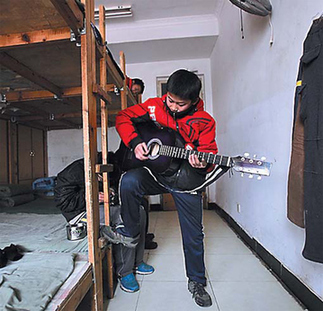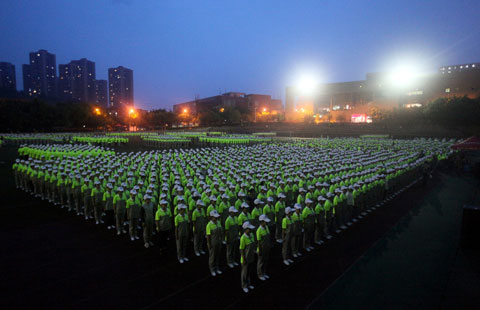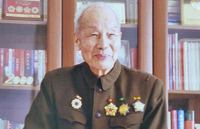Children without parents still lack help, protection
By He Dan (China Daily) Updated: 2013-01-15 01:46"The boy is fine now, but we don't want a time to come when he can have the surgery only because he's in a critical situation."
Registered as a nonprofit organization in 2004, the Yunnan Jiaxin Children Assistance Center has helped about 1,300 children like Chang who lived or worked on the streets.
 |
|
A boy plays guitar in a dormitory room at the boarding school. |
For those who are of school age and are willing to receive a formal education, the organization can arrange for them to live with a foster family, who receive financial aid in return.
For complicated reasons, these children do not have hukou, or residency permits, so they cannot go to public schools. Even if some manage to finish high school, any hope they have of going to college is usually dashed because they are not eligible to take the national college entrance exam, Lok said.
1 million youngsters
There are no official statistics on the exact number of street children in China, but experts estimate the figure at more than 1 million.
Private institutions dedicated to helping these youngsters are weighed down by challenges — not only issues over guardianship, but also site selection and a high staff turnover rate.
Wang Xianlong, who is in charge of administrative affairs for Light Love Family, a Beijing boarding school for street children, said his school has been forced from place to place on the outskirts of the capital.
The school, with 105 students and 16 staff members, moved to Shunyi district in 2011.
"Our school has moved about nine times in the past decade," he said. "We can't give these children a home if we can't find a suitable place to settle."
Soaring rent and demolition brought on by the capital's economic development are two contributors to the situation, he said. "Sometimes, we had to move because neighbors complained that our children are too noisy or dirty."
Lok said his organization has moved five times for similar reasons.
Such private institutions, which rely heavily on public donations and support from charitable foundations, often struggle to keep workers, largely because NGOs can only afford to pay low salaries.
Yan Ling, a math teacher for Light Love Family, said he has seen more than 70 teachers come and go.
He earned 500 yuan a month when he started at the school in 2007, and even now his pay is less than 2,000 yuan. The average monthly salary for Beijing residents was about 4,600 yuan in 2011.
"I've never asked our principal to pay more as I know our school's financial situation," he said.
Yan, who has a bachelor's degree from a university, said what makes him stay is his students.
"Just as you give a glass of water to a thirsty man, when you give love to these kids, they feel grateful, and they always give more back," he said, adding that he works with his students from 6 am to 6 pm every day.
"I remember when I had just come here and slept in the teachers' dormitory. Some students would stand there waiting for me to wake up so they could play basketball with me," he said.
On birthdays, he said, his bed is often full of gifts from students, such as handmade cards or gadgets they found on the street.
However, Yan said he may have to find another job with higher pay soon, as his 3-year-old son is old enough to go to kindergarten.
"I want to afford a good education for him," he added.
- Xi urges linkup on development
- China eyes multiple S&T breakthroughs in 5-year plan
- China adds 7 new free trade zones
- Xi encourages leading group to meet goals set for reform
- Foreigners to gain easier access to court verdicts
- Gaokao is gaining respect in the West
- Xi calls new PLA branch a key pillar
- Pollution fees could become law of the land
- New Xinjiang chief sees growth ahead
- Last two wanted for telecom fraud surrender










